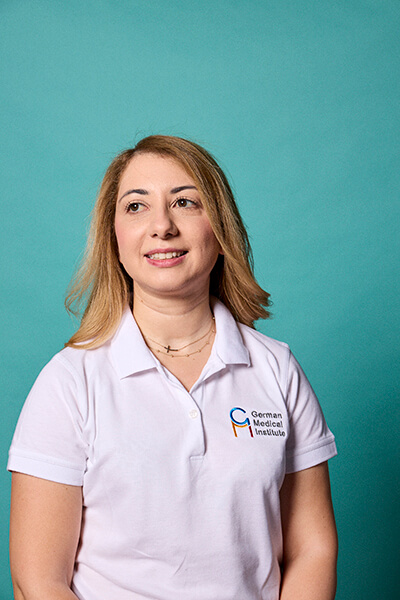Pharmacy

The Department
An essential component of any major Medical Center is the pharmacy. As a healthcare professional, the pharmacist collaborates with the medical personnel and affiliated departments within the center. They play a crucial role in matters concerning patients' medications, always prioritizing the well-being of both the patient and the hospital. With deep pharmaceutical knowledge, and continuous education on pharmaceutical issues, a pharmacist serves as a reliable source of accurate information and contributes to the advancement of a medical center.
The pharmacy of the German Medical Institute aims to meet the pharmaceutical needs of both inpatients and certain categories of outpatients.
The Team
The department is led by the Clinical Pharmacist Marina Markidou Anagiotou, and is staffed by well-trained Pharmacists and Pharmacy Technicians.
The pharmacy team:
- Fills outpatient prescriptions.
- Checks and supplies the necessary quantities of medicines and pharmaceuticals to the hospital departments, according to their needs.
- Orders, receives, and stores the required quantities of medications and pharmaceutical material.
- Prepares chemotherapy regimens for inpatients in a special cytostatic drug dissolution unit located within the department.
- Provides Clinical Pharmacy services to the various departments of the GMI.
- Provides training to Pharmacy students.

Services
CLINICAL PHARMACY
The clinical pharmacy closely collaborates with the medical staff at the Center, works to promote the proper use of medications among patients, and effectively manages medications to prevent potentially negative drug interactions and adverse reactions. The clinical pharmacist is actively engaged in the morning rounds conducted by physicians in the patient wards and ensures the accuracy of chemotherapy protocols, including dosages and methods of drug dissolution. Additionally, the clinical pharmacy supports nurses with information and guidance on drug administration and other preparations. Moreover, the clinical pharmacist plays a vital role in the Infectious Diseases Committee and holds the position of chair for the Antibiotic Consumption and Appropriate Use Surveillance Group (OECOHA) within the center.
SUPPLYING DEPARTMENTS
The department is responsible for orders for pharmaceuticals, serums, narcotics, GHS drugs and Namesake Committee drugs. It is also responsible for the storage, control, and maintenance of stock, and for supplying departments with necessary medications. Every department in the center sends its orders to the pharmacy electronically on predetermined days. Once the order is prepared, usually within 24 hours, it is delivered to the department.
CENTRAL CHEMOTHERAPY DISSOLUTION UNIT
The German Medical Institute has a central unit dedicated to the dissolution of chemotherapeutic drugs, organized into three rooms:
- The first room is the Chemotherapy Pharmacy, where chemotherapy medications are stored.
- The second room is where various materials which are required for the dissolution of chemotherapy drugs are prepared, such as needles, syringes, and serums.
- The third room, known as the "clean room," is where the reconstitution, dissolution, and mixing of chemotherapy drugs takes place within a special canopy called a laminar flow. This setup ensures the safe dissolution of the drugs for both patients and staff.
To manage the daily volume of chemotherapy at our center, we have two laminar flow machines.
Specially trained pharmacy assistant technicians carry out the procedures within the central chemotherapy dissolution unit. They always work under the supervision of a pharmacist, who also ensures the final product control.
FAQs
If you have any questions about your medication or how to take it, you can contact your doctor at our center or contact the pharmacy of the German Medical Institute.
Under no circumstances should you break the tablet or open the capsule. The capsules should be swallowed whole and not chewed. You may contact your healthcare practitioner to suggest another form of medication if available.
The chemotherapy you receive either orally or intravenously does not affect those around you. However, if your chemotherapy is taken orally, you should be careful that other people do not come into contact with your medicine (tablets). Particular care is needed with pregnant and breastfeeding women.
Some medicines must be stored in the refrigerator (CAUTION: OXI IN THE FRIGGING). Your pharmacist or doctor will tell you about these medicines. Other medicines are stored at room temperature (23-25°C) in a dry and shaded area. Do not store medicines in wet rooms (e.g., bathrooms) or in direct sunlight. They should also not be stored with food or in places where young children can easily access them.
You should contact your doctor and report these symptoms, who will tell you whether they are due to your medication or caused by something else.
At our center’s clinical pharmacy, we are equipped to dispense specialty medications from FTA prescriptions that are exclusively sourced from hospital pharmacies. However, please note that we cannot fill prescriptions, such as those prescribed by your personal doctor, for medications related to conditions like hypertension, diabetes, cholesterol, and so on. For these types of prescriptions, you should visit local pharmacies in your neighbourhood that offer such services.

Marina Markidou
Director of Pharmacy - Clinical Pharmacist

Contact details
- (+357) 25 208 000
- [email protected]
- 1, Nikis Avenue 4108, Agios Athanasios, Cyprus
- Mon - Fri | 08:00 - 16:30



